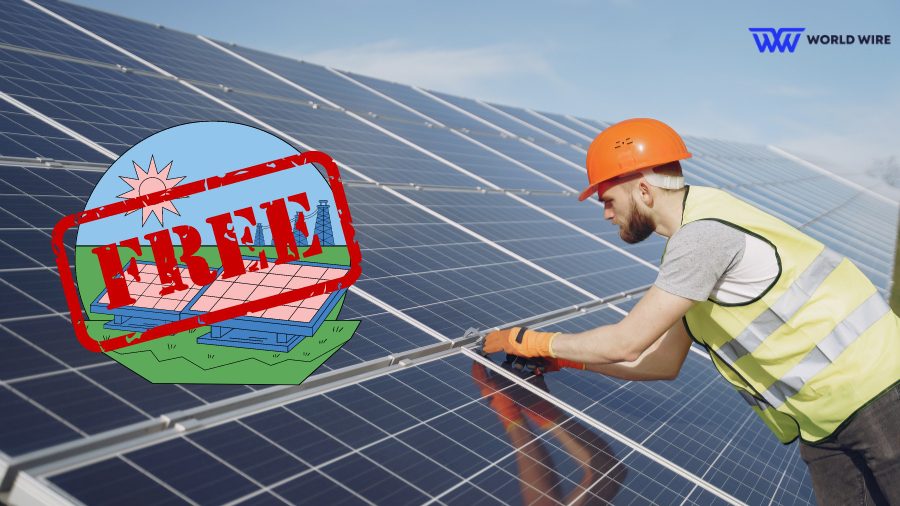Looking for a way to get free solar panels from the government? This article will provide different ways to reduce the cost of solar panels, including government incentives, tax credits, and rebates.
So, without any further ado, let’s get started –
Can You Get Free Solar Panels From the Government?
The government doesn’t offer free solar panels. However, the federal and state government and even some solar companies run programs that provide incentives through loans, grants, tax refunds, and rebates for solar panels.
You can also have solar panels for lease, but you must pay for them in monthly installments as per your contract.
What Is A Solar Incentive Program?
A Solar Incentive Program is a federal or state government initiative to incentivize solar panels. Through the program, you can install a solar system at a lower rate or on a loan, for which you have to pay monthly installments at a fixed time.
Solar panel incentives from the federal or state government can be in the form of loans, grants, tax refunds, and rebates. Normally, States with little or no sunshine and low electricity rates have better solar incentives than those with more sunshine and high electricity rates.
Where To Find Discounts On The Best Solar Panels

You can follow these steps to find the best discount on solar panels.
- The first place you must search is in your local government and state initiatives. Some state governments offer incentives in the form of grants, tax refunds, loans, or rebates.
- The best method would be to start searching for government initiatives in your local area. Open your web browser specified keywords, including your state, like “Solar Incentives in New Jersey.”
- You can look for the Federal Solar Tax Credit, Through which you can claim a 30% Tax credit on a solar panel and battery installation when filing for federal taxes.
How To Get Free Solar Panels From the Government
Getting solar panels from the government is not possible. However, you can find some government incentive programs that offer energy efficiency assistance to subsidize solar panels.
You can check the Database for State Incentives for Renewables & Efficiency. This is a great source to learn about solar incentives and tax credits by state.
The most famous federal solar system installation incentive is ITC (Federal investment tax credit) for solar heating and cooling, photovoltaic, and concentrating solar energy systems. This credit was integrated in 2006 and is still operational until December 2023.
To qualify for this credit, you must have their solar system, meet the credit requirements, and complete paperwork and some verification.
Also, many states offer a variety of incentive programs to make solar energy affordable. DAC-SASH (Disadvantaged Communities Single-Family Solar Homes) Program in California is one example of a state program that incentivizes $3 per watt solar capacity.
As per the Center for Sustainable Energy, the standard price of home solar installations in the United States ranges between $3-$5 per watt, meaning this program could cover 100% of solar system costs.
What Is A Power Purchase Agreement (PPA)

A Power Purchase Agreement (PPA) is a legal contract between you as a purchaser and a state-licensed solar energy company. In the PPA agreement, the solar company agrees to install solar panels at your home and provide electricity. The Solar Installation System generates electricity at a predetermined price.
However, instead of a fixed monthly payment like in a lease, you will have to pay for the power generated by the solar panels during the billing period. A Power Purchase Agreement is a good option if you cannot purchase the entire Solar Energy System upfront.
How To Reduce The Upfront Cost Of Solar
Although you can’t get free solar panels from the government, there are still multiple ways to reduce the upfront cost of solar panels other than purchasing them on lease or signing a PPA contract.
The financial incentives available for solar panels include the following.
State and federal tax credits
ITC, or the solar investment tax credit, has been a major incentive for solar installations nationwide since 2006. This incentive is also called the federal solar tax credit, giving 30% of the project costs back as a tax deduction.
Also, you can receive additional credits based on your home location and capitalize on both incentives.
Sales and property tax exemptions
You can get a sales tax exemption and an immediate discount while purchasing some panels. Tax exemptions ensure you do not pay your local sales tax for solar panels and mounting equipment.
Moreover, your local government may offer property tax exemptions for solar panels, proposing the increase in home value resulting from the solar installation is not taxed.
For example, a $500,000 residence that installs a $25,000 solar panel system will still be taxed on its $500,000 value.
Solar rebate programs
Solar rebates are direct cash incentives for installing solar systems. The local government agencies or utility companies generally manage these programs. Solar rebates and tax credits may be combined. However, you must subtract the rebate and calculate the tax credit per your net system cost.
Apart from these three, there are other ways to reduce the cost of Solar panels.
SRECs, or Solar Renewable Energy Certificates, are performance-based houses. They don’t reduce the solar energy system’s cost but provide additional cash by selling electricity to the local government produced by your solar panel. For every 1,000 kilowatt hours (kWh) of electricity, you can get 1 SREC. The exchange rate of SREC is different for every state, and every state has its SRECS laws.
How To Choose A Reputable Solar Company
You should always purchase solar panels from a renowned company to avoid fraud. Many solar providers are in the market, and choosing the suitable one may need clarification. However, look for helpful tips below to choose a reputable solar company.
- Look for a solar company that delivers high-quality products and professional workmanship.
- You should consider getting a warranty from your company while buying solar systems to protect your investment. With the warranty, you can replace any components for free that fail during the warranty period.
- Suppose you purchase solar panels on a lease. In that case, you should carefully review the terms and conditions before signing a contract, as some companies may provide a fake agreement by selling you low-quality equipment.
- Look for the life span of a solar panel provided by your company. Most solar panels are designed to stay long and can work for almost 25 years.
FAQ
Can I get free solar panels from the government?
The government doesn’t provide free solar panel. However, you can search for some local government or solar companies’ programs that provide incentives for solar power installation.
Can I get my solar panels installed for free?
Solar panels can be installed for free. However, you will have to pay for it later. Some companies offer solar leases or PPA agreements with zero upfront costs but a fixed monthly fee during the specified contract term.
How much do solar panels cost?
The solar panels cost for a home solar system varies based on equipment brands and installation costs. SEIA, or The Solar Energy Industries Association, is a valuable reference that furnishes detailed information about the various solar industries in the country, including regular prices by market segment.
Which states get free solar panels?
No state offers free solar panels. You may find some government agencies that subsidize solar panels as part of their energy efficiency assistance program.
Enter your email to stay updated with offers
If you can’t see the form above, click here to open the form.







Add Comment